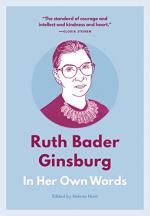
|
| Name: _________________________ | Period: ___________________ |
This test consists of 15 multiple choice questions and 5 short answer questions.
Multiple Choice Questions
1. From where does the Supreme Court’s power come?
(a) Its reason and judgment.
(b) The Congress and Senate.
(c) Its military might and wealth.
(d) Its intelligence and education.
2. Does Ginsburg believe it is ideology that keeps lawyers from helping to repair tears in their communities, nation, and world?
(a) Yes, in general.
(b) Often.
(c) Sometimes.
(d) No, not in general.
3. Supreme Court judges are infallible only because of what reason?
(a) They are very intelligent.
(b) They are final.
(c) They hold all the power.
(d) They know the law better than anyone else.
4. What phrase was Ginsburg known to say often?
(a) I object.
(b) Free to be you and me.
(c) I know what is best.
(d) That is not Constitutional.
5. What does Ginsburg consider herself, regarding her interpretation of the Constitution?
(a) An originalist.
(b) A non-originalist.
(c) A textualist.
(d) A structuralist.
6. According to Ginsburg, to make sure that the judges are not infusing their own beliefs and ideas into the constitutional text, how should the law be read?
(a) Literally.
(b) Loosely.
(c) Figuratively.
(d) In a way that supports current public opinion.
7. Ginsburg became the first woman to join what prestigious group at Harvard?
(a) Harvard Women’s Organization.
(b) Harvard Honor Society.
(c) Harvard Law Review.
(d) Harvard Civil Rights Committee.
8. To what did President Bill Clinton nominate Ginsburg?
(a) The Court of Appeals.
(b) The Supreme Court.
(c) Federal Court.
(d) District Attorney.
9. According to Ginsburg, when did our Constitution get perfected in regard to equality?
(a) After World War I.
(b) After the War of 1812.
(c) After the Vietnam War.
(d) After the Civil War.
10. According to Ginsburg, if one is to be a lawyer and just practice one's profession, one is very much like what other field?
(a) A plumber.
(b) Congress.
(c) Teaching.
(d) A judge.
11. Why does Ginsburg believe Supreme court judges are infallible?
(a) Because Supreme court judges are appointed for life.
(b) Because Supreme court judges are intelligent.
(c) Because Supreme court judges have short appointments.
(d) Because Supreme court judges completely understand the law.
12. According to Ginsburg, what did the Founding Fathers think about human rights?
(a) Human rights were only for while males.
(b) Human rights were subjective.
(c) Human rights were only for the educated.
(d) Human rights were natural rights.
13. When Ginsburg enrolled at Harvard Law School, she was one of how many women in a class of 500 students?
(a) 9.
(b) 2.
(c) 50.
(d) 100.
14. Who said, “If Ruth and I came of age in a time when there was no discrimination against women, we would be retired partners in a major law firm”?
(a) Celia Bader.
(b) Sandra Day O’Connor.
(c) Florence Allen.
(d) Martin Ginsburg.
15. Ginsburg only became engaged with the women’s rights movement at what time?
(a) When she was a professor.
(b) When she became a member of the Supreme Court.
(c) When she was a student at Columbia.
(d) When she lost her first civil rights case.
Short Answer Questions
1. According to the author, even when she is writing a dissent, Ginsburg’s words can be what?
2. What does Ginsburg consider probably the most important [recent case], in that the Court had an opportunity to stop making elections turn on who can raise the most money?
3. What does Zedek, Zedek, tirdof mean?
4. What is far more important than the particular individuals who compose the Court’s bench at any given time?
5. When does Ginsburg say it is appropriate for the Supreme Court to step in?
|
This section contains 628 words (approx. 3 pages at 300 words per page) |

|




